The immune system plays a crucial role in protecting the body against infectious agents. A recent study published in the Journal of Experimental Medicine sheds new light on the mechanisms governing an effective immune response to infections. Led by Université de Montréal immunologist Nathalie Labrecque’s team, the research focused on the early events in the response of immune cells known as CD8+ T lymphocytes.
The study revealed that the NOTCH signaling pathway, which is conserved in all multicellular organisms, plays a vital role in the differentiation process of CD8+ T cells. This differentiation process is necessary for the cells to become competent at controlling infections. The researchers also found that NOTCH enables the action of other transcription factors, further highlighting its importance in the immune response.
When a naive CD8+ T lymphocyte recognizes an infectious agent, it must quickly generate fighting cells to combat the infection. While most of these fighting cells will perish, some will be preserved as memory T cells, capable of recognizing the attacking agent in case of reinfection. The creation of these fighting cells requires the reprogramming of CD8+ T cells, a process known as differentiation, which is orchestrated by the NOTCH signaling pathway.
The researchers discovered that NOTCH signaling is involved from the very beginning of the CD8+ T cell differentiation process, which lasts around seven to 10 days. They identified reticular fibroblasts in the lymph nodes as the structural cells responsible for providing the ligand for the NOTCH signal, essential for triggering the differentiation events of CD8+ T lymphocytes. This finding was a significant advancement in understanding the immune response mechanisms.
The study focused on the immune response involving the NOTCH signaling pathway in early infection contexts. The researchers believe that these new insights could lead to innovative therapeutic targets for improving immune responses, especially in cases of chronic infections or cancer. Understanding the collaboration between the NOTCH signaling pathway and other transcription factors could provide valuable information on advanced phases of the mechanisms governing the immune response.
Overall, this research highlights the critical role of the NOTCH signaling pathway in CD8+ T cell differentiation and the importance of fibroblasts in lymph nodes in orchestrating the immune response. The findings pave the way for further investigations into therapeutic targets to enhance immune responses and address chronic infections and cancer.


